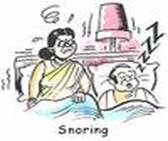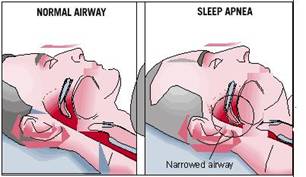|
GaramChai.com
>> GaramChai.com
Features Archieve >> Medical
Articles
This section
GaramChai features Medical articles by Dr.Kumaresh Krishnamoorthy
Snoring
and Sleep apnea
Sleep
is not just resting or taking a break from busy routines -
it is essential to physical and emotional health. Adequate
sleep may also play a role in helping the body recover from
illness and injury. Even occasional sleeping problems can
make daily life feel more stressful and less productive.
How
serious is snoring?
Snoring
does not only keep you awake the whole night, but it can also
annoy your spouse and even destroy your happy relationship.
Relationships had been terminated and marriages destroyed
all because of snoring. Just imagine if you had to use separate
bedrooms or even divorce because your spouse can't take it
any longer. In addition to posing a strain on relationships,
it can also indicate a possibly dangerous and life-threatening
disease.
What
causes snoring?
The noisy
sounds of snoring occur when there is an obstruction to the
free flow of air through the passages at the back of the nose
and mouth. This area is the collapsible part of the airway.
When you breathe in your sleep, the tongue, muscles of the
upper throat and the soft palate (roof of the mouth that separates
nasal and oral cavities) collide with the uvula. Air is forced
through a narrow airway, causing a loud vibration.
Snoring
may keep you awake the whole night, and the following day
you are tired, your performance at work or school is badly
affected and you feel as though you could sleep on your desk
at work. Although some may hear their own snores when they're
half awake, most snorers are often unaware that they snore
until they are told of it.

What
is sleep apnea?
Sleep
apnea is a debilitating sleep and breathing disorder defined
as the cessation of breathing for 10 seconds or more (an
apnea) at least five times per hour of sleep. During sleep,
the body's muscles relax, which can cause excess tissue
to collapse into the upper airway (back of the mouth, nose
and throat) and block breathing. When breathing is interrupted
by an obstruction in the airway, the brain doesn't get enough
oxygen. The body reacts by waking enough to start breathing
again. These arousals may occur hundreds of times each night
but do not fully awaken the patient, who remains unaware
of the loud snoring, choking and gasping for air that are
typically associated with obstructive sleep apnea. The symptoms
include feeling tired in the morning like you didn't get
enough rest. The individual may fall asleep during the day
and may spend more time in bed than normal. There is chronic
daytime exhaustion and long-term cardiovascular stress.
After many years with this disorder elevated blood pressure
and heart enlargements may occur.

Risk
Factors for Sleep Apnea:
-
·Obesity
– Fatty cells infiltrate the throat tissue, possibly narrowing
the airways.
-
Snoring
may actually be a cause of changes that triggers some
cases of sleep apnea, and not a consequence of it.
-
Family
history – Inherited characteristics in the face and neck
can cause breathing abnormalities.
-
Other
medical conditions – Individuals with severe heartburn
appear to be at higher risk for sleep apnea.
-
When
the muscles of the mouth are too relaxed either from alcohol
or drugs the tongue falls backwards and causes obstruction.
-
Male
gender.
-
Too
tight collars may irritate neck tissues.
-
Old
age: Snoring gets worse with old age.
-
Blocked
nose: If your nose is blocked at night, this may cause
snoring.
-
Sleeping
position: Lying on your back causes the tongue to fall
backwards and block the airway.
-
Children:
Large tonsils and adenoids can cause severe snoring and
sleep apnea.
Symptoms
- Loud
snoring
- Increased
daytime sleep
- Personality
changes (irritable, depressed)
- Hypertension
(frequent)
Monitoring
your sleep
Checking
ones sleep in a sleep study lab is often the only way to rule
out sleep apnea. A sleep study records how the lungs, heart
and other parts of the body function while one is asleep.
It is painless, risk free and takes one full night. Videotaping
of the sleep is done and a technician watches the monitors
all night and makes sure all equipment is working properly.
The results of the study will be discussed by your doctor
including whether your air passage is blocked and whether
you have sleep apnea.
Treatment:
Lifestyle changes:
- Sleeping
on one’s side instead of on one’s back can reduce sleep
apnea · Patients who are overweight should attempt
to reduce their weight
- Patients
should quit smoking
- Alcohol
should not be consumed within four hours of sleep
- Avoid
sleeping pills because this puts you into deep sleep when
your muscles relax more causing the throat tissues to sag
and restrict breathing
- Exercise
regularly.
Continuous
Positive Airflow Pressure (CPAP) involves wearing a mask
that supplies a steady stream of air through the nose during
sleep. The airflow keeps the nasal passages open sufficiently
to prevent sleep apnea.
Surgical Options: Uvulopalatopharyngoplasty (UPPP)
– this procedure removes soft tissue on the back of the throat
and palate, thereby increasing the width of the airway at
the throat opening. Nasal Surgery – Nasal obstructions such
as a deviated septum may play a role in sleep apnea, and can
be corrected through appropriate surgical procedures. Surgery
in the throat includes removal of the tonsils and adenoids.
In some cases of severe sleep apnea an opening in the necks
breathing tube (tracheostomy) may be needed.
Dr.Kumaresh
Krishnamoorthy, M.S (ENT)
Head and Neck Surgery Fellowship (Buffalo, USA)
Neurotology & Skull Base Surgery Fellowship (Cincinnati,
USA)
Senior Consultant in ENT - Head and Neck Surgeon and Skull Base
Surgeon
Apollo Hospitals, 154/11, Bannerghatta Road, BANGALORE 560 076,
INDIA
Phone: 91-(0) - 99002 36819
Email: drkumaresh@drkumaresh.com
|



